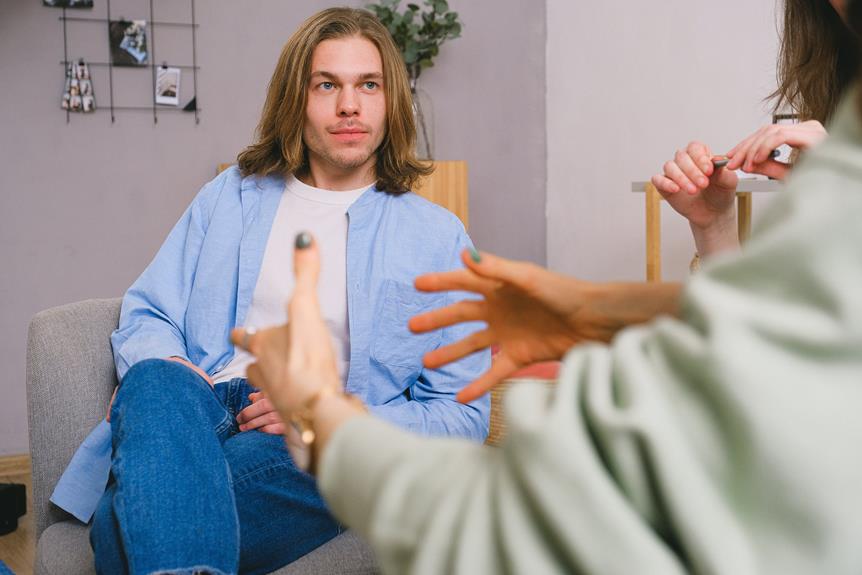Are you a woman seeking therapy that is tailored to your unique needs? Look no further. This guide to gender-specific therapy is here to empower you on your journey towards healing and growth.
With a focus on active participation and personalized strategies, you'll discover the benefits of gender-specific treatment. From finding the right program to overcoming challenges, this article will provide you with the knowledge and tools you need to thrive.
Let's embark on this empowering path together.
Benefits of Gender-Specific Therapy
When it comes to therapy, one of the key benefits of gender-specific therapy is that it allows you to connect with others who've had similar experiences. Gender-specific therapy is designed to address the unique needs and challenges faced by individuals of a specific gender. This approach has proven to be highly effective in providing targeted support and promoting healing.
By participating in gender-specific therapy, you have the opportunity to share your experiences in a safe and understanding environment. This can foster a sense of validation and belonging, knowing that you aren't alone in your struggles. Connecting with others who've faced similar challenges can be incredibly empowering and can provide a sense of camaraderie and support.
Gender-specific therapy also employs specific techniques that are tailored to the needs of a particular gender. Therapists who specialize in gender-specific therapy have a deep understanding of the social, cultural, and psychological factors that influence individuals of a specific gender. This expertise allows them to provide more focused and relevant interventions, increasing the effectiveness of the therapy.
Types of Gender-Specific Treatment
To explore the various options available, consider different types of gender-specific treatment that can cater specifically to your needs as a woman.
Gender-specific counseling is a form of therapy that's tailored specifically to address the unique challenges and experiences that women face. It provides a safe and supportive space where you can discuss and explore topics related to your gender identity, relationships, self-esteem, and personal growth.
Gender-specific support groups are another valuable option to consider. These groups bring together women who share similar experiences, providing a sense of community, understanding, and validation. They offer a platform for women to openly discuss their concerns, learn from one another, and gain support from others who've faced similar challenges.
Additionally, women-focused workshops and retreats can provide a transformative experience. These programs offer a combination of therapeutic activities, educational sessions, and group discussions that are designed to empower women and help them develop new skills, insights, and strategies for personal growth and wellbeing.
Finding the Right Gender-Specific Program
Explore different resources and strategies to help you find the gender-specific program that best suits your needs and goals as a woman. When seeking female focused therapy, it's important to consider specialized treatment options that address the unique experiences and challenges that women may face.
Start by researching online, where you can find directories or databases that list gender-specific programs in your area. These resources often provide detailed information about the programs, including the types of therapy offered, the qualifications of the therapists, and the specific areas of focus. Additionally, you can reach out to local mental health organizations, women's support groups, or your healthcare provider for recommendations and referrals.
Another helpful strategy is to ask for recommendations from other women who've experienced gender-specific therapy. They can share their personal experiences and provide insights into the effectiveness and suitability of different programs. Support groups, online forums, or social media platforms can be valuable platforms for connecting with other women who've gone through similar journeys.
Lastly, don't hesitate to contact the gender-specific programs directly to gather more information. Inquire about the treatment approaches, the duration of the program, the availability of individual or group therapy sessions, and the qualifications of the therapists. This will help you determine if the program aligns with your goals and preferences.
Empowering Strategies for Women in Rehab
Discover the empowering strategies that can help you thrive as a woman in rehab. Going through rehab can be a challenging journey, but with the right techniques and support, you can overcome obstacles and emerge stronger than ever. Here are some empowering strategies specifically designed for women in rehab:
- Cultivate self-compassion: Be kind to yourself and practice self-care. Understand that recovery takes time and that setbacks are a normal part of the process.
- Build a strong support network: Surround yourself with people who uplift and understand you. Seek out gender-specific support groups where you can connect with other women who've similar experiences.
- Focus on personal growth: Use this time in rehab to explore your strengths, passions, and goals. Engage in activities that bring you joy and help you discover your true potential.
These empowering techniques, along with gender-specific support, can greatly enhance your journey in rehab. Remember, you aren't alone in this process. Lean on the support of others, embrace your inner strength, and believe in your ability to thrive.
Overcoming Gender-Specific Challenges in Recovery
You can overcome gender-specific challenges in recovery by recognizing and addressing the unique obstacles you may face as a woman. Recovery is a personal journey, and as a woman, you may encounter societal pressures and expectations that can make it even more challenging. Addressing these pressures head-on is crucial to your success.
One of the challenges you may face is navigating gender roles. Society often imposes specific roles and expectations on women, which can affect your recovery process. It's essential to recognize these societal expectations and question whether they align with your own values and goals. Remember, your recovery is about your well-being and finding your authentic self.
Another gender-specific challenge to overcome is addressing societal pressures. Women are often expected to be caretakers, nurturers, and to put others' needs before their own. This can create a conflict when prioritizing your recovery. It's essential to set boundaries and prioritize self-care. Remember that taking care of yourself isn't selfish; it's necessary for your overall well-being.

